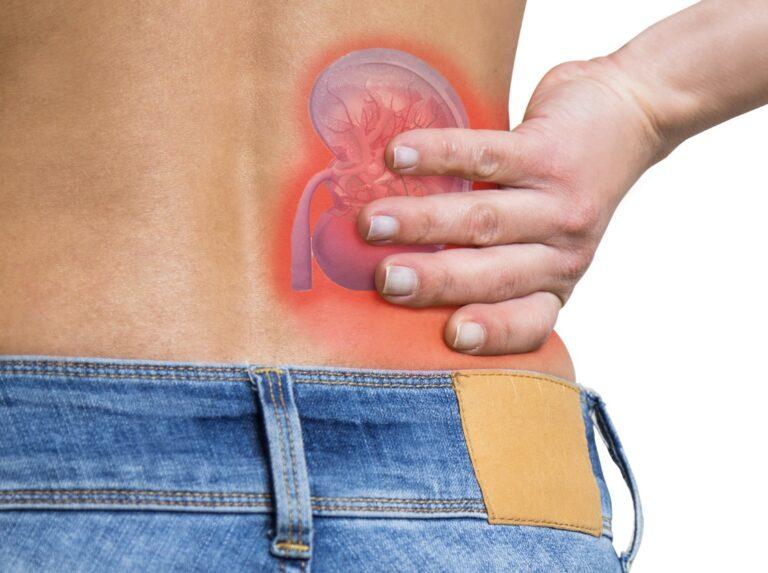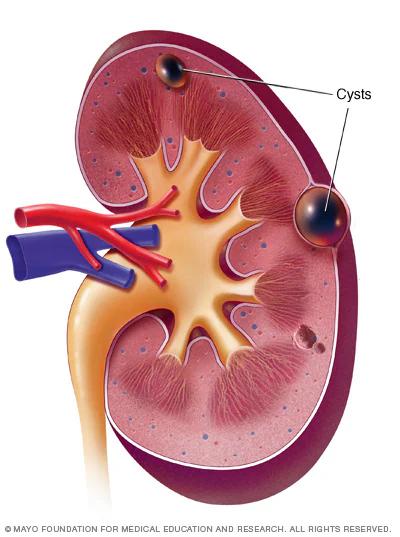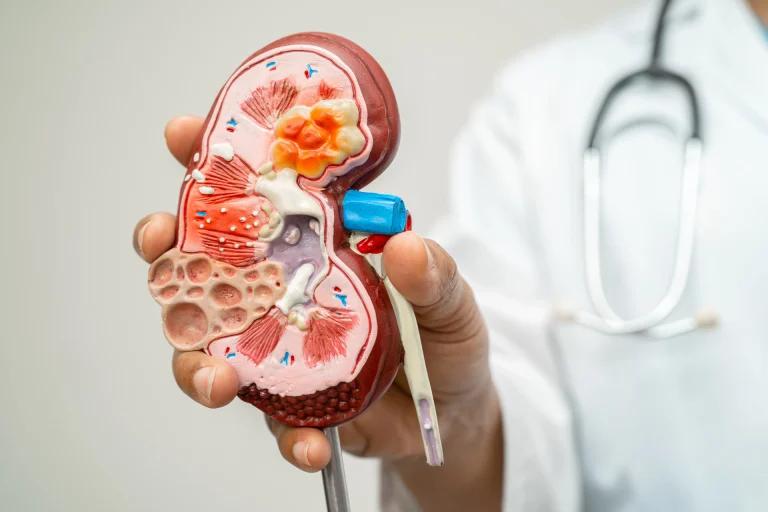Kidney disease is a broad term that covers a wide range of conditions that can affect the function of your kidneys. Kidneys filter your blood and remove excess wastes and fluids from your body which are then excreted in your urine. When kidney disease occurs, it means that your kidneys are not able to filter your blood and remove wastes as they should. There are different types of kidney diseases and each one can progress differently. In this blog post, we will take a look at some of the different types of kidney diseases.
What do the kidneys do?
The kidneys are a pair of organs that filter the blood and produce urine. They are located in the lower abdomen, on either side of the spine. The left kidney is usually slightly larger than the right one. Each kidney contains about a million filtering units called nephrons.
The kidneys filter about 120-150 litres of blood every day and produce about 1-2 litres of urine. Urine is composed of water, electrolytes (e.g. sodium, potassium, chloride) and urea (waste product of metabolism). The nephrons in the kidneys filter out the waste products and excess fluid from the blood and send them to the urinary tract to be excreted as urine. At the same time, they return needed substances (e.g. proteins, glucose) back into circulation.
The kidneys are essential for regulating fluid and electrolyte balance in the body, as well as for removing waste products from metabolism. The kidneys also help to maintain blood pressure by producing a hormone called erythropoietin, which stimulates the production of red blood cells. In addition, the kidneys produce a hormone called calcitriol, which helps to regulate calcium absorption and maintain bone health.
Kidney dysfunction can lead to serious health problems, including high blood pressure, heart disease and kidney failure.
What are the four main types of kidney disease?
Diabetic nephropathy
Diabetic nephropathy is a kidney condition that can occur in people with diabetes. Over time, high blood sugar levels from diabetes can damage the tiny filters (called glomeruli) in your kidneys. This damage can cause your kidneys to leak proteins into your urine. Diabetic nephropathy can also cause your kidneys to lose their ability to remove wastes and excess fluid from your body. When this happens, waste can build up in your blood and make you feel very ill. Symptoms include changes in urine output, fluid retention and high blood pressure. Diabetic nephropathy is a serious complication of diabetes, it can eventually lead to kidney failure. With early diagnosis and treatment however, many people with diabetic nephropathy can live long healthy lives.
Glomerulonephritis
Glomerulonephritis – This type of kidney disease is caused by an inflammatory condition in the glomeruli or the tiny filters in the kidneys that remove waste from the blood. Glomerulonephritis can be caused by infections, autoimmune disorders or other diseases. Symptoms include changes in urine output, protein in the urine and swelling. Early diagnosis and treatment are important because this type of kidney disease can progress to kidney failure.
Polycystic kidney disease PKD
Polycystic kidney disease (PKD) is a genetic disorder in which multiple cysts develop in the kidneys. PKD cysts are fluid-filled sacs that can grow very large and put pressure on the surrounding kidney tissue, eventually causing the kidneys to enlarge and lose function. This can lead to kidney damage, kidney failure and other serious health problems.
People with PKD often have no symptoms in the early stages of the disease. As PKD progresses, cysts may form in other organs, such as the liver, pancreas and brain. PKD can be painful and debilitating and can significantly reduce lifespan. Symptoms include pain in the abdomen or sides, high blood pressure, urinary tract infections and blood in the urine. However, there are treatments available that can help people manage their symptoms and live long healthy lives. Early diagnosis and treatment of PKD are essential to preventing serious complications.
Chronic kidney disease CKD
CKD is a progressive disease, meaning it gets worse over time. It can be caused by diabetes, high blood pressure, genetic disorders or other conditions that damage the kidneys. In its early stages, CKD may not cause any symptoms. However, as the disease progresses, patients may experience fatigue, weakness, loss of appetite, weight loss, numbness in the hands and feet, trouble urinating, muscle cramps and heart problems. Treatments focus on slowing down the progression of chronic kidney disease and managing symptoms. People with chronic kidney disease should see their doctor regularly to monitor their condition and catch any potential problems early on.
Treatment for CKD usually involves controlling the underlying cause, managing symptoms and making lifestyle changes to slow the progression of the disease. If CKD progresses to kidney failure, treatment may involve dialysis or a kidney transplant.
Diagnosis of kidney disease
Kidney disease is also known as renal disease, a serious condition that can lead to kidney failure. Early diagnosis and treatment are essential for kidney disease patients. Kidney function can be measured by the glomerular filtration rate (GFR). The result of the GFR is the best way to measure your level of kidney function and determine your stage of kidney disease. Kidney function can also be estimated by renal function tests including urine tests and blood tests. Urine tests can measure the levels of the protein albumin, red blood cells and white blood cells in the urine. Blood tests can measure the levels of kidney function markers such as creatinine and urea in the blood. A kidney biopsy may also be performed to diagnose kidney disease. A kidney biopsy involves taking a small sample of kidney tissue for examination under a microscope.
Treatment of kidney disease
Kidney disease is a serious condition that can lead to renal failure. Early diagnosis and treatment are essential to slow the progression of kidney disease. There are several different treatment options available, depending on the cause and severity of the condition. Common treatments include:
Medication
Chronic kidney disease (CKD) is a serious health issue and can be managed with medications to reduce the long-term side effects. Medicines are used to treat the underlying causes of kidney disease and specifically address medical problems including high blood pressure, abnormal levels of proteins and waste products in the blood and infections. In some cases, medications may also be prescribed to reduce fluid overload caused by blood faults or heart failure related to kidney disease.
ACE (Angiotensin-converting enzyme) inhibitors, ARB’s (Angiotensin receptor blockers), Beta-blockers, diuretics and calcium or vitamin D supplements are all medicines that can help manage CKD.
ACE inhibitors have been especially beneficial for people suffering from high blood pressure or diabetes related to CKD. ARBs also seem to be effective in controlling blood pressure or protecting the kidneys from damage caused by proteins in the urine. Beta-blockers have been helpful in managing symptoms of heart failure for those with CKD. Diuretics can help manage water retention in the body associated with CKD. Finally, it is important to supplement your diet with either calcium or vitamin D as they are essential minerals typically lost through dialysis treatments.
Careful attention must be taken when managing medications for kidney disease since they can easily interact with those taken for other illnesses. Discussing these medications with your pharmacist or doctor is a key part of successfully managing your kidney disease and keeping yourself healthy.
Lifestyle changes
Many people with kidney disease can improve their health by making changes to their lifestyle. Here are some examples:
- If you have diabetes, keeping your blood sugar level under control will help your kidneys. Work with your doctor to set goals for your blood sugar levels
- If you have high blood pressure, taking your medicine as prescribed and making lifestyle changes such as eating a healthy diet, maintaining a healthy weight and exercising regularly will help your kidneys
- If you have high cholesterol, taking medication and making lifestyle changes such as eating a healthy diet and exercising regularly will help your kidneys
- Cut down on the amount of salt in your diet. This includes avoiding processed foods and adding salt when cooking
- Drink plenty of fluids, especially water. This will help flush out waste products from your body
- Exercise regularly. This will help to keep high blood pressure (hypertension) under control
- Lose weight if you are overweight. This will help to reduce the strain on your kidneys
- Don’t smoke. Smoking damages your blood vessels and is bad for your overall health
Making these lifestyle changes can be difficult, but they are important for people with kidney disease. Talk to your doctor about what changes would be best for you.
Dialysis
When kidney function begins to decline, dialysis may be recommended in order to remove waste and extra fluid from the body. Dialysis is a process that can be used to filter blood and remove these substances. There are two main types of dialysis: hemodialysis and peritoneal dialysis. Hemodialysis uses an artificial kidney machine to clean the blood, while peritoneal dialysis uses the natural filtering ability of the peritoneum (a membrane in the abdomen) to cleanse the blood. Each type of dialysis has its own benefits and drawbacks, so it is important to discuss with your doctor which option is best for you. Treatment with dialysis can help improve the quality of life for those with kidney failure, so it is important to understand all of your options.
Kidney transplant
A kidney transplant is a treatment for kidney failure. A kidney transplant is an operation to place a healthy kidney from a donor into your body. The new kidney will take over the job of filtering your blood. You will no longer need dialysis.
Kidney disease is a general term for any damage to or diseases of the kidney. There are different types depending on what caused it, how it progresses and what your chances for recovery are. By knowing the different types, you may have a better chance of catching it early on to improve your outcome. If you think you may have any type listed here, please see your doctor as soon as possible.
Sources
Medical Disclaimer
NowPatient has taken all reasonable steps to ensure that all material is factually accurate, complete, and current. However, the knowledge and experience of a qualified healthcare professional should always be sought after instead of using the information on this page. Before taking any drug, you should always speak to your doctor or another qualified healthcare provider.
The information provided here about medications is subject to change and is not meant to include all uses, precautions, warnings, directions, drug interactions, allergic reactions, or negative effects. The absence of warnings or other information for a particular medication does not imply that the medication or medication combination is appropriate for all patients or for all possible purposes.








